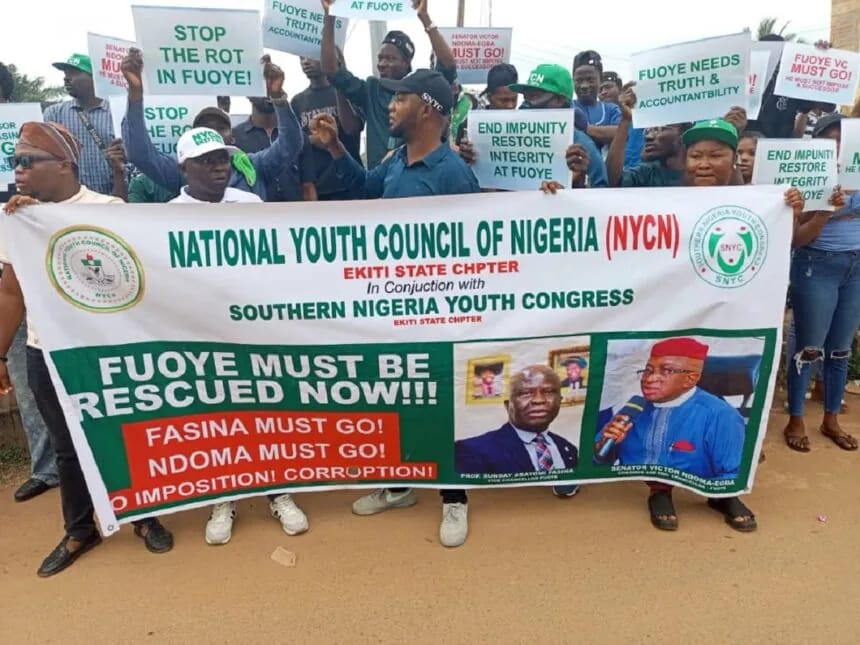A wave of tension gripped the Federal University Oye-Ekiti (FUOYE) earlier this week as hundreds of youths took to the streets to protest against alleged corruption, abuse of office, and financial mismanagement within the university’s leadership.
The demonstration, which took place at FUOYE’s main campus in Oye-Ekiti, was led by the National Youth Council of Nigeria (NYCN), Ekiti State Chapter, in collaboration with the Association of Southern Nigeria Youth Congress (ASNYC). The protest, described as peaceful but intense, saw large crowds carrying placards and chanting solidarity songs demanding accountability from the university’s top management.
Placards displayed by the protesters bore strong messages such as “Stop the rot in FUOYE,” “VC Fasina must go,” and “Rescue FUOYE now.”
Protesters Demand Accountability and Leadership Overhaul
The demonstrators made a series of serious demands, calling for the immediate suspension of the university’s Vice-Chancellor, Prof. Abayomi Sunday Fasina, and the removal of the Pro-Chancellor and Chairman of the Governing Council, Senator Victor Ndoma-Egba (SAN).
According to the protesting groups, the university’s management had allegedly turned the institution into a “feeding trough,” with frequent reports of misuse of funds, questionable appointments, and unethical administrative practices.
They also demanded:
- A forensic audit of FUOYE’s financial transactions and property deals since 2021.
- The suspension of the ongoing Vice-Chancellor selection process, which they described as compromised.
- The dissolution of the current Governing Council and its replacement with an independent oversight body.
- A thorough investigation into alleged cases of sexual harassment and abuse involving some senior staff members.
Details of the Allegations Against FUOYE Management
The protesters accused the university leadership of several unethical practices, including:
- Financial Mismanagement:
The NYCN alleged that millions of naira were wasted on off-campus Council meetings frequently held in Abuja rather than on the university campus, a practice seen as unnecessary and extravagant. - Unusual Payments:
One of the most shocking revelations made by the group was the alleged approval of a ₦128 million “research leave” payment to the Vice-Chancellor — a move they described as “unprecedented and disgraceful” in Nigeria’s academic history. - Suspicious Property Transactions:
The protesters also alleged that the university management had engaged in questionable property transactions valued at over ₦700 million, without transparency or accountability. - Moral Decay and Misconduct:
In addition to the financial irregularities, there were allegations of institutionalised sexual harassment and the covering up of several misconduct cases involving prominent staff members. - Manipulated Leadership Succession:
According to NYCN, the ongoing process to appoint a new Vice-Chancellor was being manipulated to favour a preferred candidate, thereby undermining fairness, merit, and transparency.
University Management Reacts to Allegations
In response to the growing tension, the Public Relations Officer of FUOYE, Mr. Foluso Ogunmodede, dismissed all the allegations, describing them as “false, baseless, and politically motivated.”
He explained that the university management has always upheld accountability and transparency in all its operations. According to him, FUOYE has achieved unprecedented growth under Prof. Fasina’s leadership, especially in infrastructure, academic programs, and research expansion.
Ogunmodede further emphasized that the ongoing protest was being fueled by external groups who were not students of the university but had political motives to discredit the institution’s management.
Students’ Union Government (SUG) Issues Warning Against Protest
Meanwhile, the FUOYE Students’ Union Government (SUG) distanced itself from the protest, describing it as unauthorised and potentially harmful to the peace and order on campus.
In an official statement signed by the SUG President, the union advised students to remain calm and focus on their academic activities while the university management handled the situation through the appropriate channels. The union vowed to protect the campus community from any form of external disruption, urging students not to participate in politically-motivated demonstrations.
Background and Timeline of the Crisis
| Date | Event |
|---|---|
| 3 November 2025 | Youths under NYCN and ASNYC stage protest at FUOYE main campus, demanding suspension of the VC and dissolution of the Governing Council. |
| 4 November 2025 | Media coverage intensifies as allegations of corruption and abuse of office gain national attention. |
| 5 November 2025 | FUOYE SUG and management issue official statements dismissing the allegations and warning against unauthorised protests. |
Possible Implications for the University
The ongoing crisis at FUOYE has raised serious concerns about governance, accountability, and transparency in Nigerian tertiary institutions. If the allegations are found to be true, it could lead to major administrative shake-ups within the university and possibly attract intervention from the Federal Government and education regulatory bodies.
Beyond the immediate controversy, the protest also highlights the growing frustration among Nigerian youths over corruption and poor leadership in the education sector. It underscores the demand for reforms that prioritise merit, ethical conduct, and transparency in university administration.
What to Expect Next
As tension remains high, the following developments are being closely monitored:
- Whether the Federal Ministry of Education or National Universities Commission (NUC) will step in to investigate the allegations.
- Whether the Vice-Chancellor or Pro-Chancellor will face suspension pending investigation.
- The outcome of any proposed forensic audit into FUOYE’s finances and property dealings.
- The fate of the Vice-Chancellor selection process, which protesters claim has been compromised.
Public Reaction and National Attention
The protest at FUOYE has triggered widespread discussion among students, alumni, and civil society groups across Nigeria. Many have commended the youths for speaking up against perceived corruption, while others have called for caution to prevent the university’s reputation from being damaged prematurely.
Social commentators have also urged the government to ensure an independent investigation that would restore public confidence in FUOYE’s leadership and preserve the integrity of the institution.



